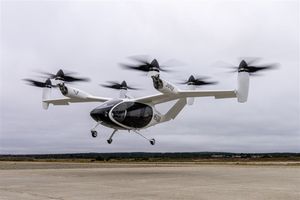Financial News
Rocket Lab Signs Exclusive License Agreement to Manufacture Space Radio Technology from Johns Hopkins University Applied Physics Laboratory
Rocket Lab USA, Inc. (Nasdaq: RKLB) (“Rocket Lab” or “the Company”), a global leader in launch services and space systems, today announced it has entered into an exclusive license agreement with the Johns Hopkins University Applied Physics Laboratory (APL) to commercialize near and deep space capable small spacecraft telemetry and control radio technology. The Frontier-S by Rocket Lab software defined radio (SDR) enables affordable communications and radio navigation for planetary and other missions beyond low Earth orbit (LEO), as well as communications and radio navigation for missions in GPS-denied environments.
The Frontier-S by Rocket Lab, based on the APL Frontier Radio that flew on missions like the Van Allen Probes, Parker Solar Probe, and the Emirates Mars Mission, packs Deep Space Network and other common waveforms into a single board package with up-screened commercial components and low power digital signal processing for high reliability applications. Frontier-S by Rocket Lab includes extended functionality not typically available in a low-cost radio including a coherent transponder to enable radiometric navigation methods, timekeeping functions, and a hardware-based critical command decoder. Compatible with spacecraft as small as 6U cubsesats, the Frontier-S by Rocket Lab SDR offers a lightweight, low power, high radiation tolerant telemetry and command solution for deep space missions that is also affordable for missions in LEO demanding high reliability.
The APL-designed and Rocket Lab-manufactured Frontier-S SDRs are flying today on Pathstone, Rocket Lab’s second Photon mission, are currently being integrated into Rocket Lab’s upcoming CAPSTONE mission to the moon for NASA and are planned for Rocket Lab’s own private Photon mission to Venus. The Frontier-S by Rocket Lab is also the baseline telemetry and control radio for all Photon missions requiring an S-band radio. Rocket Lab is offering the Frontier-S SDR commercially as an off-the-shelf radio solution to other satellite integrators, joining a growing list of spacecraft component offerings like reaction wheels and star trackers.
“Frontier-S radios are another strategic addition to Rocket Lab’s growing space systems portfolio of in-house built products and capabilities, further strengthening our position as an end-to-end space company,” said Peter Beck, Rocket Lab Founder and CEO. “Enabling long-distance communication and telemetry in deep space is difficult for any mission, but especially for small satellites where mass and power constraints are a challenge. Frontier-S radios provide a compelling communications solution for interplanetary missions, as well as those closer to home in low Earth orbit. APL has a long history of making critical contributions to NASA and international missions to meet the challenges of space, applying science, engineering, and technology to develop leading spacecraft, instruments, and subsystems. We are excited to combine APL’s strong history of innovation with Rocket Lab’s proven ability for high-volume manufacturing to deliver an industry-leading communications solution at competitive costs and on reduced timelines.”
About Rocket Lab
Founded in 2006, Rocket Lab is an end-to-end space company with an established track record of mission success. We deliver reliable launch services, spacecraft components, satellites and other spacecraft and on-orbit management solutions that make it faster, easier and more affordable to access space. Headquartered in Long Beach, California, Rocket Lab designs and manufactures the Electron small orbital launch vehicle and the Photon satellite platform and is developing the Neutron 8-ton payload class launch vehicle. Since its first orbital launch in January 2018, Rocket Lab’s Electron launch vehicle has become the second most frequently launched U.S. rocket annually and has delivered 105 satellites to orbit for private and public sector organizations, enabling operations in national security, scientific research, space debris mitigation, Earth observation, climate monitoring, and communications. Rocket Lab’s Photon spacecraft platform has been selected to support NASA missions to the Moon and Mars, as well as the first private commercial mission to Venus. Rocket Lab has three launch pads at two launch sites, including two launch pads at a private orbital launch site located in New Zealand, one of which is currently operational, and a second launch site in Virginia, USA which is expected to become operational by the end of 2021. To learn more, visit www.rocketlabusa.com.
View source version on businesswire.com: https://www.businesswire.com/news/home/20211118006340/en/
Contacts
+ Rocket Lab Media Contact
Morgan Bailey
media@rocketlabusa.com
More News
View More





Quotes delayed at least 20 minutes.
By accessing this page, you agree to the following
Privacy Policy and Terms Of Service.



